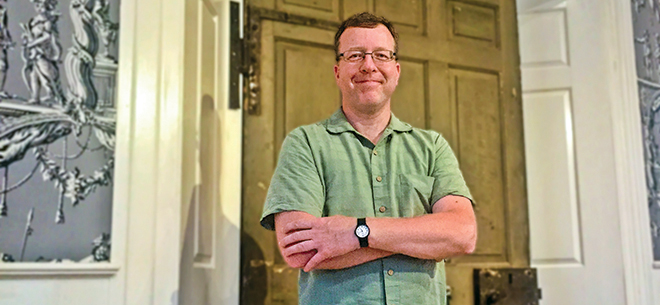Playwright Patrick Gabridge brings to life an untold story of America’s past in Cato & Dolly at the Old State House

If we could glimpse Boston’s past through a keyhole, what might we see? Boston playwright Patrick Gabridge takes us on that journey in his latest play, Cato & Dolly (through September 26). Commissioned by the Bostonian Society to accompany the Old State House’s current exhibition, Through the Keyhole, the play is performed in front of a door salvaged from the entrance to the historic Hancock Mansion, which once stood on Beacon Hill.
Cato & Dolly is one of the first plays produced by Gabridge’s new company Plays in Place, which shares site-specific stories through drama. “You get a certain richness from a site that is hard to replicate within a theater,” Gabridge explains. “With the Hancock door, my charge was to make a play about people associated with this incredible object.”
Gabridge has decades of experience bringing history to life. “Not quite half my work is historical,” he claims. “I want to show the humanity behind people from long ago and empathize with them. Their struggles aren’t so different from ours in a lot of ways.” Cato and Dolly are both real Bostonians. Dolly was the wife of statesman and Declaration of Independence signatory John Hancock, and Cato was an enslaved man in the Hancock household. “Dolly Hancock was an interesting person who went through a lot that the history books have ignored,” Gabridge says. “Cato comes up in the record, but we don’t know a lot about him. I was really intrigued by these two people in particular who occupied the same space for a long time, over this rich historical period.”
The play is free with admission to the Old State House, and most often its audience is comprised of families exploring the Freedom Trail. While this bit of historical theater is a wonderful surprise for many visitors, it also carries serious messages about how complicated and dangerous life was for black Americans, women and children. Gabridge explains, “When we think that in the past things were simpler and easier, it doesn’t do us any favors. It makes us too nostalgic.…The best part of being a playwright is that we are always trying to learn as much as we can about the human condition and about the world.”


